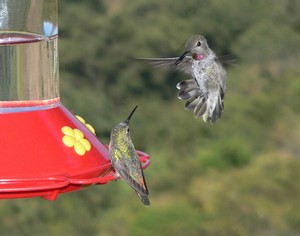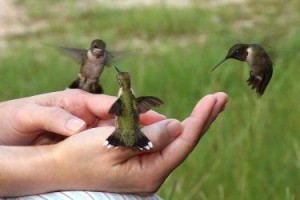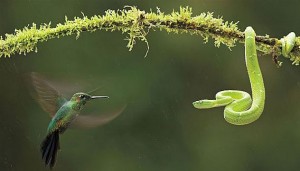by Stephen Cocconi ©2012
 I live in the Sierra Foothills at a place I call Hummingbird House, because of the small contingent of “hummers” that visit our feeders. They daily perform a passion play for me where the actors may improvise their parts, but the theme of the story is always the same. It is a theme of cooperation through contest: confrontation for the sake of demonstrating the urgency of one’s need.
I live in the Sierra Foothills at a place I call Hummingbird House, because of the small contingent of “hummers” that visit our feeders. They daily perform a passion play for me where the actors may improvise their parts, but the theme of the story is always the same. It is a theme of cooperation through contest: confrontation for the sake of demonstrating the urgency of one’s need.
As individuals, the hummingbird can fight, protect, and even share, as long as boundaries are honored and they are not encroached upon. How? They seem to have what I can only call a willingness to confront any competitor and even fight when necessary, but not to kill or destroy. Nor do they rob from the other their ability to live. The translation imbued by me is an important lesson: “me first, keep your hands off mine, don’t invade my space and in return, I will not kill you or invade yours. We can share as long as I get what I need.”
Call it Nature’s Détente. Michael characterizes or anthropomorphizes this fierce little bird as a mighty Warrior in a miniature package. When the Hummingbird sees the color red it flies into action knowing that the energy it needs to survive is contained somewhere in the object of its attraction. With a speed that any thrill seeker or strategic conqueror can admire, it immediately positions itself to swoop in and takes what it needs. Darting, pausing, and sprinting in maneuvers which seem as precise and agile as to dazzle the observer but whose end game is the possession of the prize. This is the Hummingbird’s Warrior Way.
When other hummers appear, targeting the same objective, a boldness seems to fill all of the pursuers with a complete lack of fear; an instinctive drive to preserve and defend. No fear, just blatant machine-like precision and aggression to make sure its acquisition is first and its needs are met.
Watching this, what comes to mind is surprisingly not to view it as a contest nor combat, but a ballet between Wills. At 70 beats per second, over 4200 beats per minute, it is mankind’s first real example of warp speed. Any moment of misstep renders one the victor and the other runner-up. Notice, I did not say loser? Because this game is not rigged with a winner-take-all direction, but rather as sequenced design which allows each, in turn, to take part in the feast of the flower or hummingbird feeder: but one at a time!
Whichever rival gets the first taste is not so much a function of talent, size, or speed, but of determination, intensity, and unrelenting desire. Driven by a need to find energy, to be nourished and to be sated in its quest, the little hummingbird and its fellow challengers perform aerial acrobatics with a velocity and precision the like of which human beings still have not matched. It is grace in motion. It is a program of a higher order human greed seeks to match and control, but human admiration delights in its beauty and marvels in amazement. Appreciation and awe trump the obsession to emulate and copy the other thing and instead simply revel in the other itself.
But when two similarly possessed and equally matched challengers face each other, then a contest ensues seldom matched in the animal kingdom. I have witnessed two hummingbirds fly into each other with such force and velocity, chest into chest, sending them both into free-fall. With that power and aggression, if match by two war planes, each would have been crushed and exploded in a fiery conflagration, destroying both. But not God’s inventions: NO! With an architecture that by scale, if man could reproduce, could withstand the mightiest collisions or devastation earthquakes, the tiny hummer meet his opponent on the field of battle with full intent, complete commitment, and utter determination. Colliding in mid-air the two aspirants did not attack or seek to murder the other, but to establish the supremacy of their need and the full-blown willingness to run the other into the ground. How two such seemingly delicate birds could produce a “thud” of such volume at their mutual engagement literally shocked me. Then, to watch them, locked in an embrace that would otherwise be a gesture of lovers, force each other into freefall, willing to drive the other into the ground to establish the primacy of their claim. But in the end, one merely yielded, taking its turn in due time, surrendering to the fact that the need of the other was more urgent. And so too, does the apparent victor, once full and sated, withdraws back to its original boundaries. And the game continues. Opponents unscathed but the contest determined – for that moment!
Then also, as the supreme intelligence of Darwin’s less cited but equally potent observation noted, it is not “survival of the fittest” that takes precedent, but preservation of the species and the diversity inherent in all of its variation within the individuals who comprise it. Nothing is truly “lost” nor “wasted” by Nature or in it, but its viability and intention to remain and proceed is constantly put to the test.
Victory is not then so much the dominance of one individual over another all the time, or maintenance of some pecking order. For with the mighty hummingbird, what is revealed is a rotation of and priority of the satisfaction of urgent needs. Thus, what I have witnessed with the hummer, has not been so much a continual struggle for limited resources, but an orchestration, a shifting of a queue in which each soloist makes its play the loudest and most precise in its desire for center stage. The spot light is the source of energy it seeks. But instead of applause, its bow is taken after being sated upon the nectar of the flower.
Thus, as the Hummingbird shows us, a Warrior’s finest acts are not his weapons or armament, but his temperament, his commitment, his understanding that to preserve the integrity of One’s Self life does not usually require the vanquishing of a competitor, but rather the establishment of a boundary, the assertion of one’s needs. I think of these in human terms as my principles, such as one’s right to life and to live it.
But I and every other human hummer must live this principal by coexisting with others. For seeing others as “enemy” who must be “conquered”, “vanquished” or “destroyed” yields only a diminishing return on energy invested. For at the end of each encounter, with the opponent dead or rendered inoperative, the entirety of the whole is diminished. A species is weakened, not strengthened, by such tactics; these are counter to the long term health of the whole.
I have learned much from these compact Warriors: their efficiency, their intensity, their minimal use of violence; but most poignant is their total engagement once the battle has been undertaken. Even in their confrontations there is an acknowledgement that all in the arena must take some of the prize; each in proportion to his efforts and each in turn. But all must be fed lest the game become one of elimination.
And anyone who can still do arithmetic must arrive at the only true answer worth accounting for: That without more than one player in the game, you have no game at all! And as for human beings, that game is Life on Earth. So, this is the kind of Warrior I become: Resolute Hummingbird…swift, intense, and when the moment calls for it: fully engaged!
 In 2012, a year that is cast with the theme of Warrior, set to the overture of principle defense, imbued with the test of a King’s right to manifest its rights; take these ideas and become a Hummingbird of your own choosing. But remember something else I have witnessed and concluded: although once the order is established amongst those vying for nectar is set and the first retires, clearing out so others may partake, the Hummingbird then preserves his own energy for itself. It cannot and does not enable his peers. Each individual is responsible for its own flight and asserting its rights. Its life force must engage with intensity and willingness to drive towards fulfillment of its own needs, to whatever degree it can...and it will be fed!
In 2012, a year that is cast with the theme of Warrior, set to the overture of principle defense, imbued with the test of a King’s right to manifest its rights; take these ideas and become a Hummingbird of your own choosing. But remember something else I have witnessed and concluded: although once the order is established amongst those vying for nectar is set and the first retires, clearing out so others may partake, the Hummingbird then preserves his own energy for itself. It cannot and does not enable his peers. Each individual is responsible for its own flight and asserting its rights. Its life force must engage with intensity and willingness to drive towards fulfillment of its own needs, to whatever degree it can...and it will be fed!
And lastly, know this about the Warrior in integrity: like the Samurai it bears no malice, seeks no revenge, and does not attack or defend in hatred; but with full awareness that all balance is at stake. And for humans and hummingbirds, the balance is one of expending our own internal energy efficiently, and keeping sight on the balance between the overall health of the species. Thus, find your principles that satisfy not only your right to life, but to the greater contribution to the preservation and advancement of your species. What differentiates you from the hummingbird is simply this: the bird governed by the programmed dictates of its DNA has no choice but to perform within the symphony written for it. But humankind is an equal composer and has the free will and creativity to score an orchestral composition either with harmony, beauty, and counterpoint; or disintegrate into a cacophony of noise resulting in a deafness for all.
The Warrior becomes artist when he realizes that his weapons are instruments, and with those instruments, he/she must build or destroy. The choice is yours!



Sorry, the comment form is closed at this time.